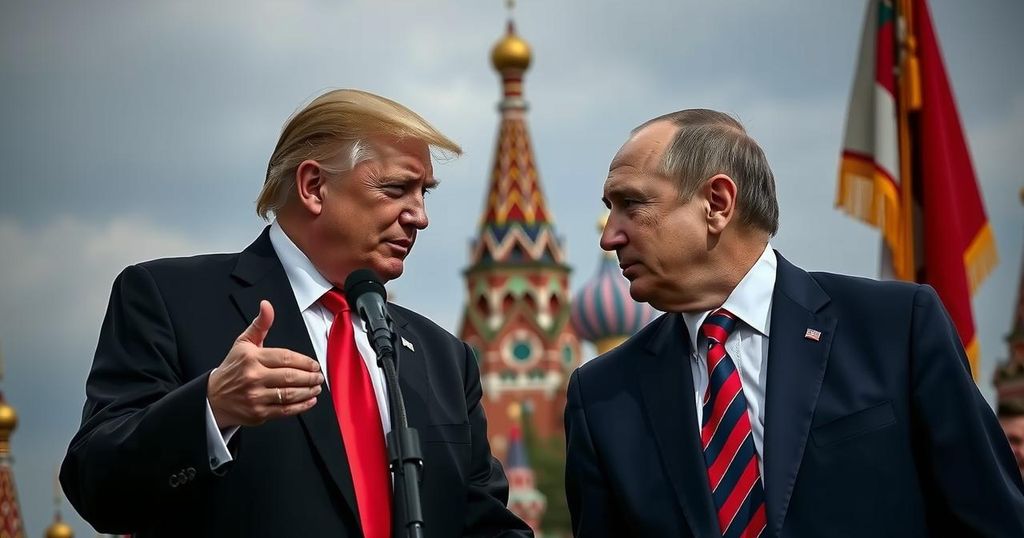Moscow and Putin: A Cautious Stance Towards Donald Trump’s Potential Second Term

Following Donald Trump’s initial victory in 2016, there was significant optimism in Moscow regarding US-Russian relations, culminating in celebratory actions by prominent Russian figures. However, Trump’s presidency concluded with severe sanctions that disappointed many, leading to a more cautious outlook on the potential for another term. Putin’s joking endorsement of Kamala Harris suggests a strategic approach, while the public opinion in Russia reflects mixed sentiments towards America, oscillating between hostility and a desire for friendship.
Moscow’s reaction to the prospect of a second term for Donald Trump is markedly more reserved than it was following his initial victory in 2016. Back then, Russian officials, including prominent ultranationalists such as Vladimir Zhirinovsky, celebrated Trump’s unexpected win with extravagant displays, anticipating a thaw in US-Russian relations. Zhirinovsky famously purchased over a hundred bottles of champagne, while others expressed their exuberance through public displays of patriotism, including driving around Moscow with American flags. In stark contrast, the current climate reflects disappointment stemming from Trump’s presidency, during which he implemented sanctions on Russia that were viewed as severe. “Trump introduced the heaviest sanctions against Russia at that time,” reflects Konstantin Remchukov, esteemed editor of Nezavisimaya Gazeta, noting that public enthusiasm has turned to caution. President Vladimir Putin himself appears to be hedging his bets by jokingly endorsing the Democratic candidate, Kamala Harris, despite the publicity that Trump receives for his comments that may resonate favorably with the Kremlin. Trump’s criticisms of US military support for Ukraine and his reluctance to directly blame Putin have drawn attention, contrasting with Harris’ staunch support for Ukraine and her candid remarks regarding Putin’s aggressiveness. Moreover, there is speculation within the Kremlin that a contentious American election could benefit Russian interests. A divided and chaotic political landscape in the United States would divert attention from international issues, potentially lessening focus on the conflict in Ukraine, a matter of significant importance for Moscow. Historically, US-Russian relations have experienced fluctuating dynamics, from rapprochement during the Reagan-Gorbachev era to deterioration under subsequent administrations. An important reminder of better times is the enduring symbol of friendship, a sculpture gifted between the First Ladies of the US and USSR, signifying a bygone era of cooperative spirit. Public sentiment in Russia towards the US also varies, as seen in contrasting opinions expressed by citizens near a popular monument. While some convey resentment towards America, others advocate for peace and friendship between the two nations, highlighting the nuanced perspectives that exist amidst political adversity. Looking forward to the upcoming election on November 5, it remains crucial to understand how American political developments resonate globally, particularly in Moscow, where the implications of US leadership linger heavily on the geopolitical stage.
The article underscores the cautious perspective of Moscow towards a potential second term for Donald Trump, contrasting it with the exuberance that followed his first electoral victory in 2016. It emphasizes how initial optimism has soured due to the realities of Trump’s governance, particularly the sanctions he enacted against Russia. The piece explores the dynamics of US-Russian relations, which have shifted from cooperative to hostile, especially following developments in Ukraine. It highlights how the Kremlin reacts to American politics while showcasing varying public attitudes in Russia towards the US, signifying broader sentiments that may influence future interactions between the two nations.
In conclusion, Moscow’s cautious stance towards a second Trump term reveals a significant shift from the celebratory atmosphere of 2016. Disappointment in Trump’s presidency, marked by stringent sanctions, has tempered initial hopes for improved relations. As the election approaches, the Kremlin appears focused on strategic advantages, including the potential for a tumultuous political environment in the US that could detract from international concerns like the war in Ukraine. Overall, Russian public sentiment remains diverse, reflecting a longing for peace alongside historical grievances.
Original Source: www.bbc.com







